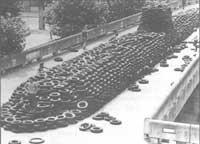What to do with tires?
At present, some tires are recycled to make passes from household entrances (“welcome”) or to form rubber pavements mixed with asphalt. Tires can also be used as fuel, but due to their high sulfur content, they generate sulfur oxides and contribute to aggravating the problem of acid rain.
Pennsylvania, in the United States, has just proposed two methods to deal with the problem of old tires.

In one of them, the tires are crushed first and then mixed with other plastics to form a composite. Then heat the mixture and the desired shape after being extruded (tubes, rings, etc.) is granted to him. The plastic so obtained is four times cheaper than conventional PVC.
The second method is more sophisticated. The tires are crushed first and then treated with a mixture of fluoros and other gases (oxygen, sulfur dioxide or chlorine). Fluoro reacts with the surface of the rubber forming free radicals. The rest of the gas components react with free radicals forming reactive groups (OH, COOH). These reactive groups react with another polymer, such as an epoxy resin, obtaining a composite bound by chemical bonds.
The size of rubber grain used limits the subsequent use of recycled material. For example, finely crushed can be used to manufacture new tires and is cheaper than natural rubber.





